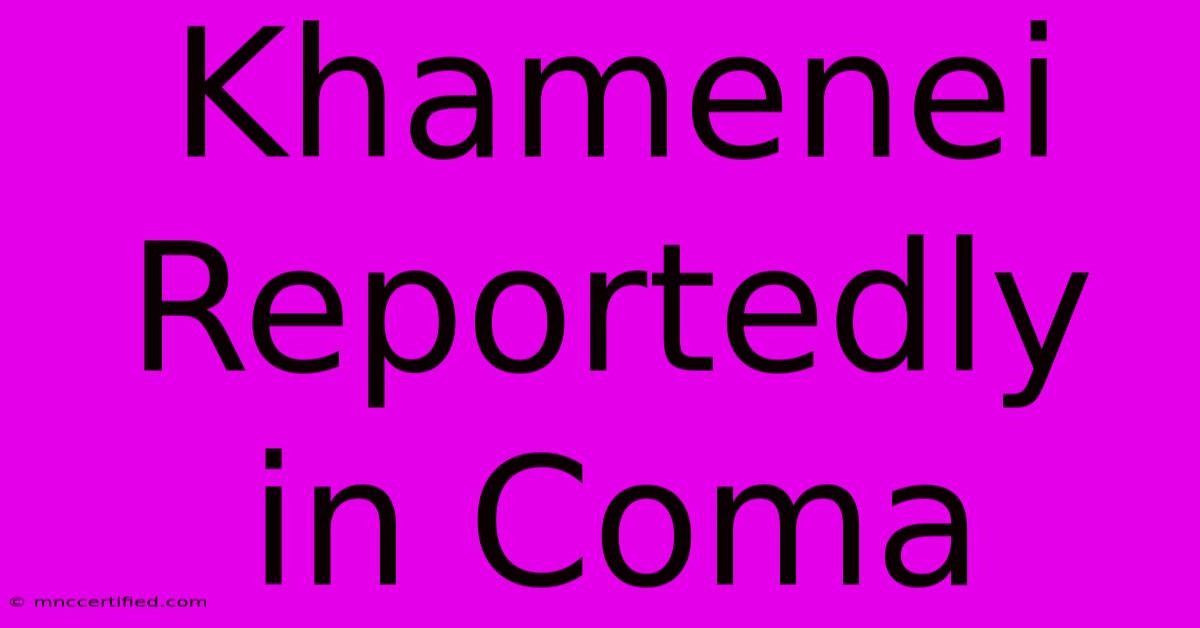Khamenei Reportedly In Coma

Table of Contents
Khamenei Reportedly in Coma: Fact-Checking the Rumors and Assessing the Geopolitical Implications
The health of Ayatollah Ali Khamenei, Supreme Leader of Iran, is a subject of intense global speculation, particularly when rumors of serious illness, such as the recent reports claiming he is in a coma, surface. While official Iranian sources maintain silence or offer only vague reassurances, the swirling rumors necessitate a careful examination of the situation, separating fact from fiction and analyzing the potential geopolitical ramifications.
The Spread of the Rumors and Lack of Official Confirmation
News of Khamenei's purported coma initially circulated on social media and less mainstream news outlets. The lack of official confirmation from Iranian authorities immediately fuels suspicion and encourages further speculation. This information vacuum is a fertile ground for misinformation to flourish, making it crucial to approach these reports with a healthy dose of skepticism. We must rely on credible, verifiable sources and avoid spreading unconfirmed claims. The absence of concrete evidence from trusted journalistic sources should raise red flags.
Analyzing the Sources and Verifying Information
It's imperative to critically analyze the origins of these reports. Are they emanating from known dissident groups with a vested interest in destabilizing the Iranian government? Do the sources have a history of accuracy and reliability? Cross-referencing information from multiple independent and reputable news agencies is essential to establish any degree of credibility. Relying solely on anonymous sources or social media posts significantly diminishes the validity of the information.
Potential Geopolitical Ramifications of Khamenei's Health
The health of the Supreme Leader carries significant weight in international relations. Iran's political landscape is complex, and a sudden power vacuum could trigger instability. Potential scenarios include:
- Succession Crisis: The process of selecting a successor is shrouded in secrecy and could lead to internal power struggles and factional infighting within the Iranian establishment. This could significantly impact Iran's domestic and foreign policies.
- Regional Instability: Uncertainty surrounding the leadership could embolden regional rivals and potentially destabilize the already volatile Middle East. This could involve increased tensions with Israel, Saudi Arabia, and other regional actors.
- Nuclear Program: The future direction of Iran's nuclear program could be affected, potentially leading to renewed international concerns and diplomatic efforts. A change in leadership could result in either a more conciliatory or a more aggressive approach.
- Economic Uncertainty: The Iranian economy is already fragile. A leadership transition could further exacerbate existing economic challenges and lead to increased social unrest.
The Importance of Responsible Reporting and Fact-Checking
In the age of rapid information dissemination, it's crucial to prioritize responsible reporting and thorough fact-checking. The spread of unverified rumors can have significant consequences, both domestically and internationally. Journalists and media outlets must adhere to rigorous journalistic standards, verifying information from multiple sources before publication. Readers, too, must adopt a critical and discerning approach to information they encounter online.
Conclusion:
While reports of Ayatollah Khamenei's health remain unconfirmed, the speculation itself underscores the significant geopolitical implications of his well-being. It highlights the need for responsible reporting, rigorous fact-checking, and a cautious approach to unverified information circulating online. The international community must closely monitor the situation and prepare for various potential scenarios that may arise from any leadership transition within Iran. The impact of such a pivotal change on regional stability and global politics cannot be overstated.

Thank you for visiting our website wich cover about Khamenei Reportedly In Coma. We hope the information provided has been useful to you. Feel free to contact us if you have any questions or need further assistance. See you next time and dont miss to bookmark.
Featured Posts
-
Live Wales Vs Australia Rugby With Gatland
Nov 18, 2024
-
Report Khamenei In Coma
Nov 18, 2024
-
Harambe Ai Token Price Prediction
Nov 18, 2024
-
Taysom Hill Saints Rushing Td
Nov 18, 2024
-
Afc North Ravens Roster Week 11
Nov 18, 2024